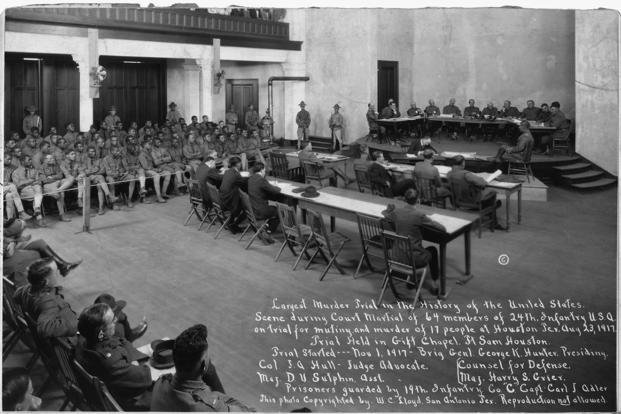More than 100 years after they were convicted of mutiny and murder and hanged for the 1917 Houston Riot, 17 Black soldiers have finally received military burial honors along with new headstones reflecting the honorable discharges the Army awarded them last year.
In a solemn ceremony Thursday at the Fort Sam Houston National Cemetery in San Antonio, Department of Veterans Affairs and Army officials gathered with relatives of the soldiers, members of the 3rd Battalion, 24th Infantry Regiment, to honor their service and replace gravestones that had marked the men as unworthy of being in a veterans' cemetery.
Rather than focus on the history of the riot, the courts-martial that followed or the Army's decision last November to overturn the convictions, Thursday's ceremony aimed to restore "dignity, honor and respect" to the soldiers who were executed and more than 90 others who were wrongly convicted, said VA Deputy Secretary Tanya Bradsher.
Read Next: Vets Say Weight Loss Drugs Have Improved Their Health, But New Patients Are Out of Luck
"These headstones are more than just physical markers. They are a symbol of promise and progress. These headstones uphold the promise enshrined in the Constitution that in the eyes of the law, all Americans have equal rights and equal worth," Bradsher said.
In 1917, the troops, members of the Buffalo Soldiers, were sent to Houston to guard a training camp. According to the Texas State Historical Association, racial tensions evolved soon thereafter against a backdrop of segregation among white residents, the police and the soldiers.
On Aug. 23, 1917, police arrested a soldier for interfering with the arrest of a Black civilian woman. Fights broke out and soldiers took up arms to help a soldier who had been arrested, while others responded to rumors that a white mob was approaching the camp by firing into the city.
Mayhem ensued. Nineteen people died, including five policemen and four Black soldiers, while 11 were seriously wounded.
The Army conducted three courts-martial at Fort Sam Houston in San Antonio, finding 110 soldiers guilty. Nineteen were hanged -- 13 within hours of the verdicts -- with 17 buried at the fort's cemetery. Sixty-three soldiers received life sentences.
On. Feb. 22, 2022, the National Cemetery Administration unveiled a marker at the cemetery explaining the history of the riot and the charges against the soldiers.
Then, last November, the Army overturned the convictions of the 110 soldiers, finding that they were "wrongly treated because of their race and were not given fair trials," according to Army Secretary Christine Wormuth.
With the announcement, as well as the Army's decision to grant all the soldiers honorable discharges, the VA began reaching out to the soldiers' relatives to ensure that they received any benefits they may have been entitled to.
This also included an effort to swap out the headstones of the 17 buried at the fort, which bore only the soldiers' names and dates of death.
The new headstones have their names, ranks, places of birth, birthdates and dates of death.
"These soldiers, known as Buffalo Soldiers, served our nation at a time when, due to racial prejudices, their service was neither appreciated, nor respected. Today, VA will forever honor their service," VA Undersecretary for Memorial Affairs Matthew Quinn said during the ceremony.
Jason Holt, a relative of Pfc. Thomas Hawkins, who was executed, acknowledged the painful history of the Houston Riot and praised federal officials for taking steps to support the soldiers decades after the event.
"It's not easy for these folks today to stand up and have to go back to their respective places of power and say they did something that involved racism," Holt said. "To say that they did something to set aside convictions, to say they did something that was controversial. That's not an easy job. I salute your courage."
Holt was among three family members of soldiers who received certificates in recognition of their relatives' service.
The ceremony included a three-round volley, the playing of Taps and presentation of colors, along with the unveiling of the headstones.
The soldiers who received the honors were: Cpl. Charles Baltimore, Pfc. William Breckenridge, Pvt. Albert Wright, Pvt. James Divins, Pvt. James Robinson, Pvt. Thomas McDonald, Pvt. Babe Collier, Cpl. James Wheatley, Pvt. Frank Johnson, Sgt. William Nesbit, Pvt. Pat McWhorter, Pfc. Thomas Hawkins, Pvt. Risley Young, Pvt. Ira Davis, Pfc. Carlos Snodgrass, Pfc. William Boone and Cpl. Jesse Moore.
The bodies of Cpl. Larnon Brown and Pvt. Joseph Smith, also executed, are buried elsewhere, having been reclaimed by family when they died.
More than 180,000 service members, spouses and family members are buried in the cemetery at Fort Sam Houston.
Related: How a Race Riot Involving an Army Unit Led to the Largest Murder Trial in US History












